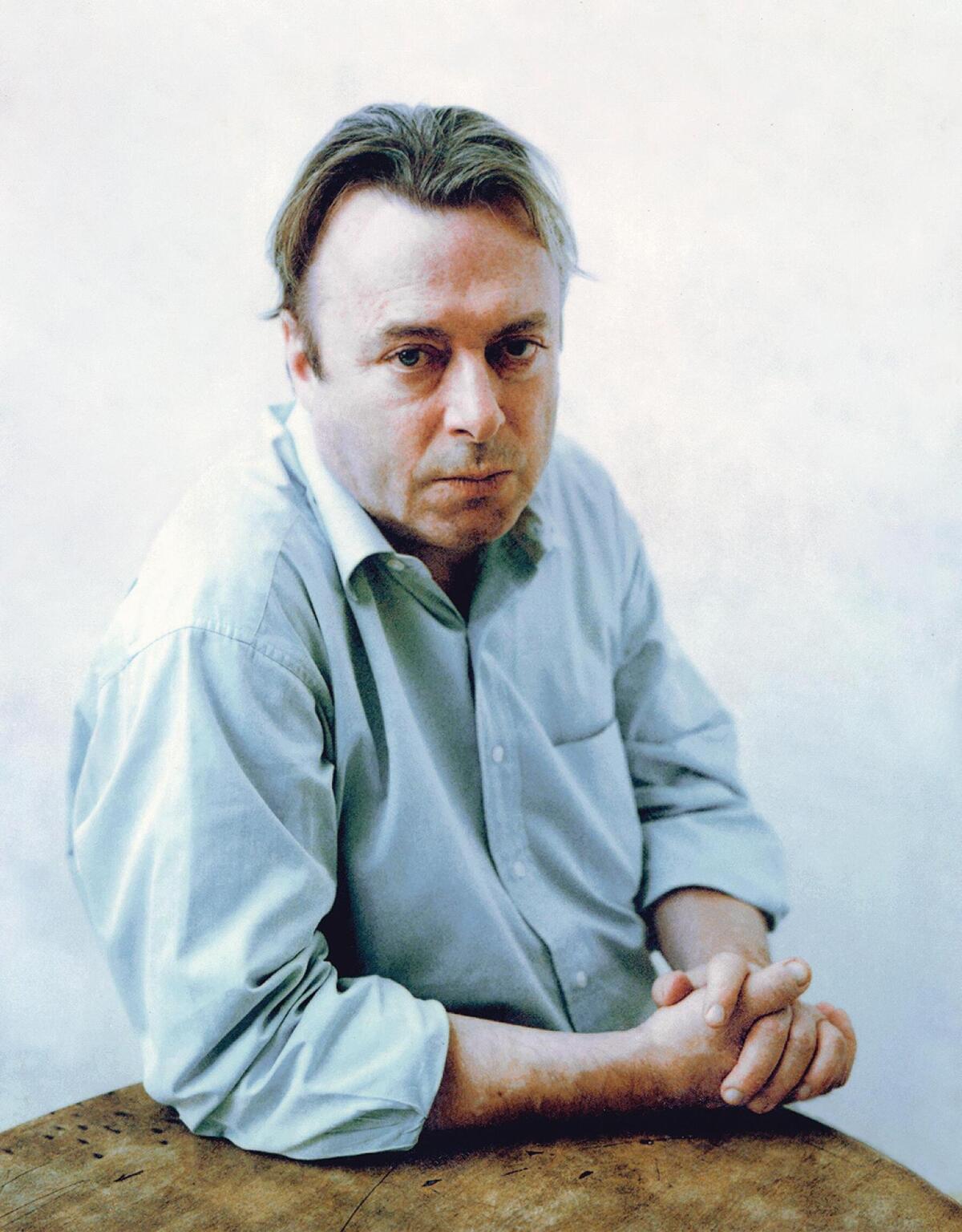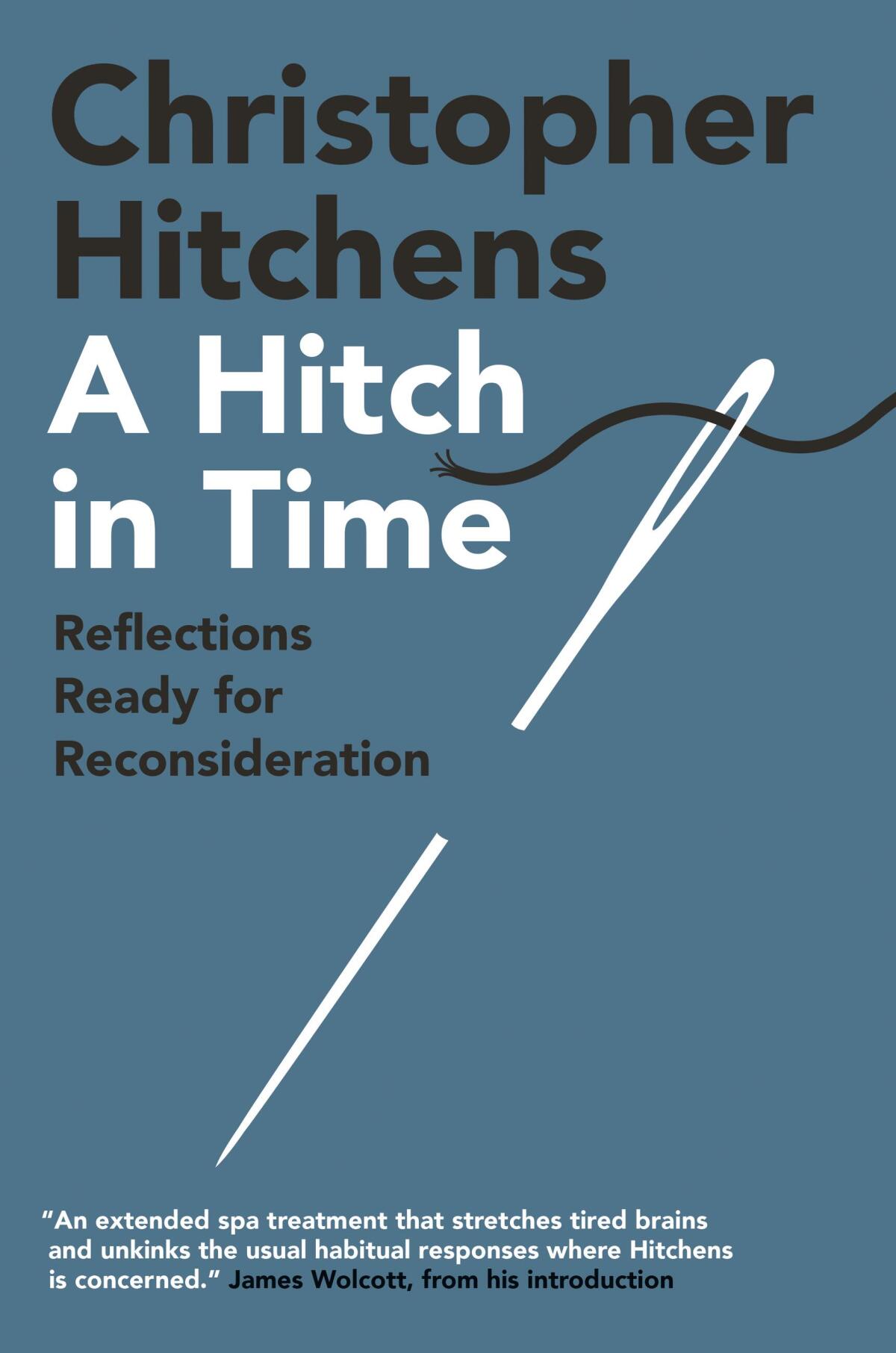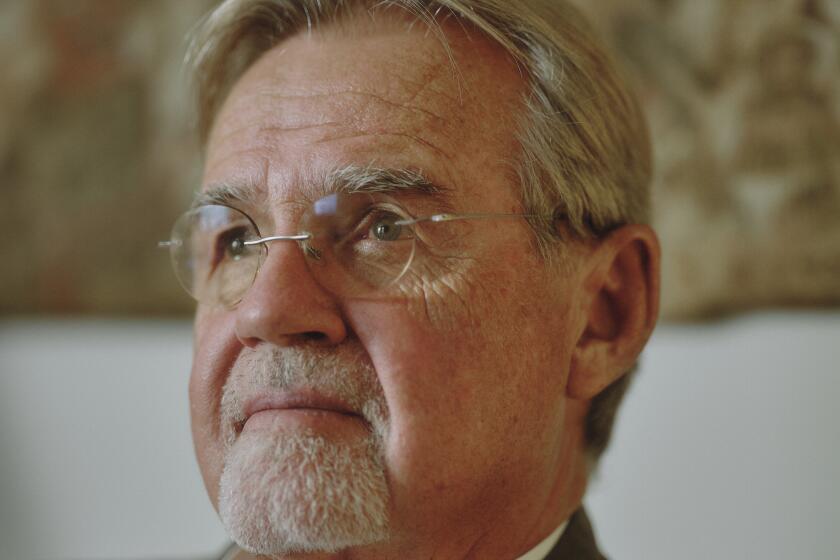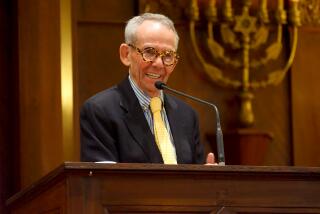Your New Year’s social media cleanse: Reread contrarian legend Christopher Hitchens

Book Review
A Hitch in Time: Reflections Ready for Reconsideration
By Christopher Hitchens
Twelve: 336 pages, $30
If you buy books linked on our site, The Times may earn a commission from Bookshop.org, whose fees support independent bookstores.
In May of 2012, a panel was convened to debate whether the work of Christopher Hitchens would stand the test of time. The irrepressible author and public contrarian had died, of esophageal cancer, less than six months earlier. Organized by Salman Rushdie, an old chum and frequent subject of “the Hitch,” the PEN-sponsored event featured a smattering of Hitchens’ colleagues, among them Vanity Fair’s former editor Graydon Carter and Katha Pollitt of the Nation.
Maybe because it was too soon to forecast posterity’s verdict, consensus was not reached. Instead, as the parties debated Hitchens’ possible misogyny, the shelf life of his deadline writing and the degree to which his stubbornness was his Achilles’ heel, there was rancor, barbed criticism and erudite defenses — a fitting intellectual wake for a writer with an insatiable thirst for argument and free expression.
Now, a dozen years after his death, the publication of “A Hitch in Time,” a new book of previously uncollected essays, offers, among other pleasures, an excuse to engage in another round of this parlor game. What to make of Hitchens, both the persona and the prose, today?
I’d been working as a lowly scrub at the Nation in New York when, in 1979, I was asked to track down Christopher Hitchens on a trip I happened to be taking to London.
These are compelling questions, not least because Hitchens trained much of his own trenchant wit (and 80-proof outrage) on relitigating the dead, from P.G. Wodehouse (riffed on in this collection) to Mother Teresa (whom Hitchens argued was “a fanatic, a fundamentalist, and a fraud”).
Contemplating a figure like Hitchens, who in his later years was both a warmonger embraced by the right and a proselytizing atheist idolized in collegiate quads, throws into stark relief how dramatically the ideological and critical landscape has shifted since he died. Describe to someone under 25 who Hitchens was in life — a widely read, wildly famous, promiscuously offensive public intellectual who subsisted on a daily diet of 75 cigarettes and a distillery’s worth of booze — and you risk sounding like you’re diagramming the workings of the steam engine or making a nomination for cultural cancellation.

I admit that I cracked open “A Hitch in Time” with some trepidation, worried that an author I admired when I was wading into the world of publishing would now manifest as a mansplainer suspended in amber. Yet if the raffish mold Hitchens cut in life is inarguably retrograde — and his blind spots on many subjects, particularly women, egregious — this collection reminds you that much of what he left on the page succeeded in his own professed aim to “write posthumously.”
A miscellany of reviews, essays and diary entries first published in the London Review of Books, the collection finds Hitchens pouncing on disparate subjects with transcendent verve. There is an excoriation of the writing of Tom Wolfe. There is a paean to Rushdie. There are insightful spankings of Bill Clinton, JFK and Richard Nixon, as well as a glib reminiscence of being spanked, literally, by Margaret Thatcher. A hilarious dispatch from the 1995 Oscars finds in that year’s most fawned-over film an omen of something distinctly (and disturbingly) American:
“But ‘Forrest Gump,’ or perhaps better say the reception accorded to ‘Forrest Gump,’ is a departure of a different kind. Here is stupidity being, not mocked or even exploited, but positively and wholesomely and simply and touchingly celebrated.”
Book review: ‘Arguably’ by Christopher Hitchens
Many of the publications in which Hitchens made his name have in the years since his death become mere grave markers of their former incarnations: thinner in page count, tamer in tone, rarely piercing the din of the scrollable silos of social media platforms. In this, “A Hitch in Time,” and Hitchens more generally, can be appreciated as an antidote to our present age of TLDR. It is a source of joy — and, for anyone disheartened by mainstream discourse today, nostalgic pangs — to see how effortlessly Hitchens reaches for a stanza of W.H. Auden or a passage from Don DeLillo to underscore an idea about politics.
Equally refreshing to those who’ve imagined a parallel universe where Hitchens curtailed his vices just enough to survive into the Trump era: There is plenty here to help us metabolize the galaxy of crises we might call 2024.
That Oscars piece, for example: It makes both Hollywood’s black hole of Marvel regurgitation and the algorithmic flattening of culture feel inevitable. An excellent inquiry into the Oklahoma City bombing, also from 1995, contains a number of zingers that presage The United States of Trump: “And indeed, the existence of an all-American underground composed of paranoid fascist mutants was until recently considered a fit topic only for those who are themselves labeled paranoid.” Indignant from the first sentence, the piece builds to a crescendo that puts a perennial strand of American toxicity firmly in the crosshairs:
“An especially irritating trope, invariably offered at times like this, is the stress on the loss of American innocence. I have at different times heard that this ‘innocence’ was lost in 1898, in 1917, in 1929, in 1945, in Vietnam .… How desirable is innocence as a condition anyway? And how come it is so easy to regain, only to be ‘lost’ once more? How one yearns for just one moment that is not clotted with euphemism and sentimentality; one moment when someone in public life would call for a fight-back, and give these ostensibly libertarian movements their right name.”
The 20 pieces composing the collection were written between 1983 and 2002 — or, to a Hitchens scholar, what might be deemed the Before Times. It was after 2002 that Hitchens, formerly a gadfly socialist who published a book arguing that Henry Kissinger be tried for war crimes, dedicated himself to championing the war in Iraq, making cameos on Fox News and coming to embody so much of the wood-paneled hypocrisy he had railed against.
Christopher Nolan made ‘Oppenheimer’ lightning-fast, but the story of writing and adapting the source book, ‘American Prometheus,’ is a half-century epic.
James Wolcott, Hitchens’ former colleague at Vanity Fair, acknowledges in his wry introduction how this period made enemies of former friends and continues to taint Hitchens: “But blood is a difficult stain to remove, and the tragic debacle that resulted from the botched occupation of Iraq, coupled with Hitchens’s chummy relationship with some of the chief architects of that horror … continues to discolor the legacy of Hitchens 2.0.”
As well it should. But there is a difference between holding someone accountable for idiocy and dismissing them as a complete idiot — a distinction that has become increasingly difficult in today’s zero-sum culture. “A Hitch in Time” hardly answers the question of whether Hitchens will be read half a century from now; only time has that answer hidden up its sleeve. But the book operates as a reminder — never dull, often stinging — of what is lost when nuanced argument is supplanted by one-note bullhorns.
Amsden is a writer based in Los Angeles.
More to Read
Sign up for our Book Club newsletter
Get the latest news, events and more from the Los Angeles Times Book Club, and help us get L.A. reading and talking.
You may occasionally receive promotional content from the Los Angeles Times.









